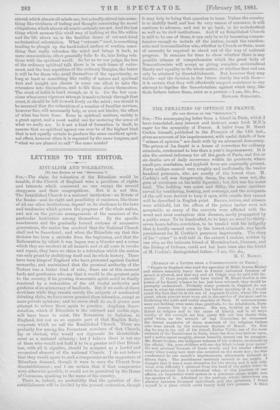LETTERS TO THE EDITOR.
RITUALISM AND TOLERATION.
fT0 TRH EDITOR OF THE " SPEOTAT011.1
SIR,—The claim for toleration of the Ritualists would be tenable, if the Church of England were a peculium of rights and interests which concerned no one except the several clergymen and their congregations. But it is not this. The Established. Church is a national institution-'—an Estate of the Realm—and its right and possibility of existence, like those of all our other institutions, depend on its obedience to the laws and tendencies which govern the progress of the whole nation, and not on the private arrangements of the members of the particular institution among themselves. By the specific enactments and the gradually formed customs of successive generations, the nation has resolved that the National Church shall not be Sacerdotal ; and when the Ritualists say that this decision has been a mistake from the beginning, and that the Reformation by which it was begun was a blunder and a crime which they are resolved at all hazards and at all costs to revoke and repair, they have no claim to a toleration which the nation can only grant by stultifying itself and its whole history, There have been kings of England who have protested against limited monarchy, and maintained. that the personal authority of the Tudors was a better kind of rule ; there are at this moment lords and gentlemen who say that it would be the greatest gain to the country if its growing democratic spirit could be finally mastered by a restoration of the old feudal authority and guidance of an aristocracy of landlords. lint if we smile at these doctrines while they remain merely the subjects of academical debating clubs, we have never granted them toleration, except as mere private opinions ; and we never shall do so, if grown men attempt to reduce them again to practice. Anglican Sacer- dotalism, which of Ritualism is the outward and visible sign, will have leave to exist, like Romauism or Judaism, in England, but not as an organic part of that English Body- corporate which we call the Established Church. There are probably few among the Protestant members of that Church, lay or clerical, who would not deprecate its diseetablish- ment as a national calamity ; but I believe there is not one of them who would not hold it to be a greater evil that Ritual- ism, with all it signifies, should be accepted as a lawful and recognised element of the national Char& I do not believe that they would agree to such a compromise as the supporters of Ritualism demand, though it were to save the Church from disestablishment ; and I am certain that if that compromise were otherwise possible, it would not be permitted by the House of Commons, speaking in the name of the country.
There is, indeed, no probability that the question of die- egkablishment will be decided by the present contention, though it may help to bring that question to issue. Unless the country is to stultify itself, and lose its very reason of existence, it will continue to advance, and not to go back, in its ecclesiastical as well as its civil institutions. And if an Established Church is still to be one of these, it can only be so by becoming compre- hensive enough to include all the nation, except the reaction- aries and irreconcileables who, whether in Church or State, must of necessity be required to stand out of the way of national. progress. It remains for time to show whether there is any possible scheme of comprehension which the great body of Nonconformists will accept as giving complete ecclesiastical liberty and. equality to the whole nation, or whether that end can only be attained by disestablishment. But however they may decide—and the decision in the future clearly lies with them— it is certain that they will effectively support resistance to any attempt to legalise the Sacerdotalism against which they, like- their fathers before them, exist as a protest.-1 am, Sir, &C., EDWARD STRACHEY.


































 Previous page
Previous page